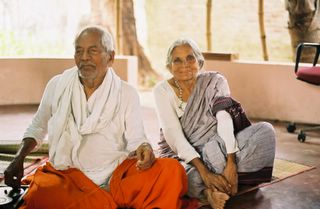Learn from the Moment (D. Willis)
Krishnammal warmly greeted my wife and I, asking how the journey had been. I was struck my how typically Tamil she was, a Tamil mother who would take care of anyone in her reach. And that she did. We slept on grass mats with sheets and awakened early, as all people in rural India do. Jagannathan was already spinning, mediating after his early morning yoga. I felt a little sheepish getting up so late. My main goals were simply to get to know Amma and Appa and to learn what they thought of the Sarvodaya movement, the central Gandhian force and movement remaining in India and Sri Lanka.
Jagannathan was, and is, Sarvodaya. This is his legacy from Vinoba Bhave and the Mahatma. I had volunteered to do an article for the Far Eastern Economic Review out of Hong Kong on Sarvodaya. What I came away with, I now realize, went far beyond the straight-forward matter-of-fact information which Americans are always demanding. Amma and Appa in their kind, gentle, Dravidian Tamil way had shown me that change need not be fancy or complex. That we need to get back to some of our roots as human beings together.
Our days in Gandhigram then, and when we visited later, were filled with simple routine, what the Japanese call kata or form. The routines of the day of Amma and Appa were like the asanas of yoga, the exercises designed more for breathing and experiencing our inner selves than for physical effects. What we learned from sitting around the Pongal Harvest Festival circle, waiting for the milk to boil, signaling the presence of spirits and ourselves in a special celebration, the women in their saris with lines and dots of Shiva, Parvati, Vishnu, and Lakshmi on their foreheads ululating a call of ‘here and now,’ was to learn from the moment, reflect upon it, and seek action.
My trip this time is a research trip for a grant I have been kindly given by a research team from Ritsumeikan University in Kyoto as I noted earlier. Professor Lim Bon and Professor Julie Higashi invited me to join their research team, which is studying the recovery and renaissance of ethnic minority communities. This is a wide-ranging project supported by Japan’s Ministry of Education, Science, and Technology. I had originally planned to visit Amma and Appa from last October for the purposes of trying to understand change agents and the many social and cultural issues facing Dalits and other oppressed communities in South India.
And then the tsunami came. I will be sharing with you my continuing thoughts on what is happening in South India, and especially with LAFTI and Amma and Appa, perhaps two or three more times during my stay there. Please do feel free to send me questions to this blog. My main goals are simply to raise consciousness in a continuing way as David and Donatella, perhaps taking a different tack, that of the anthropologist activist.
I am keen to support the efforts of reconstruction and in this spirit encourage all of you who know of Amma and Appa to write letters of support for the Right Livelihood Award that David Albert has initiated for LAFTI and these two great living saints. Recognition is important, but even more, beyond that, are the resources and profile that will come with the award, enabling them and LAFTI to give even more help to those who need it most.
Tomorrow Sekar and I will go to Kuthur and the LAFTI Ashram.
The Other David


0 Comments:
Post a Comment
<< Home